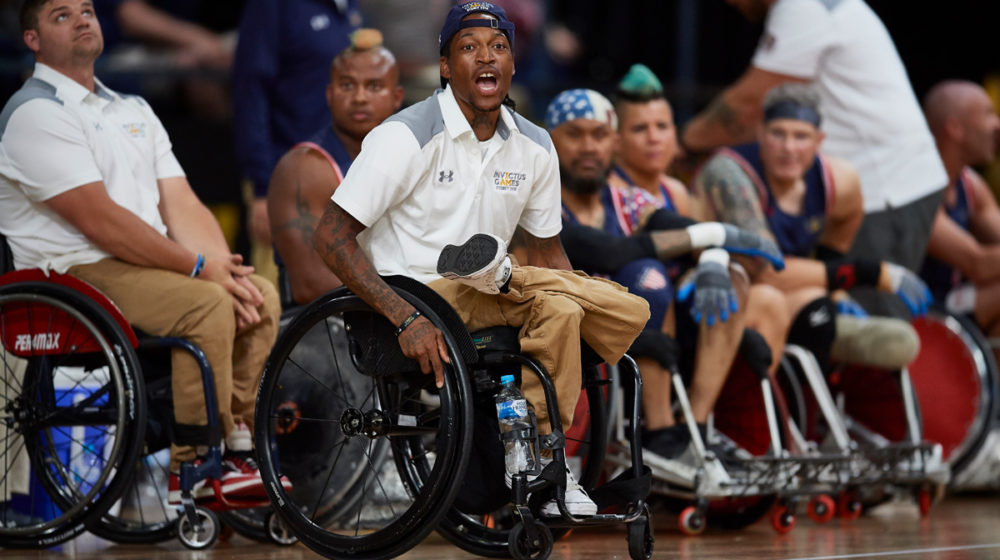Sergeant Anthony McDaniel’s son may never fully comprehend the role he played underpinning his father’s extraordinary resilience.
McDaniel – who coached the US wheelchair rugby team to a bronze medal on Thursday night – wasn’t around for Anthony McDaniel III’s birth in Mississippi, as he deployed from California to Afghanistan the following day back in 2010.
Less than four months later, while on a patrol near Kajaki in Afghanistan’s south, an improvised explosive device (IED) detonation almost completely severed McDaniel’s left hand at the wrist and lead to bilateral leg amputations.
Among McDaniel’s earliest thoughts after waking four days later in hospital in Germany was what kind of example he could set for his infant son in the years ahead.
“My mindset became that I’d been through a traumatic experience, but I wasn’t going to let my son see me giving up,” the former Marine said.
“I wanted him to look at me and think ‘My dad went through this, but he went hard at life right after’.
“I wanted to show him that there’s going to be things in life you’ll come across that could be completely left field, that you never expected, that will turn your life upside down, but it’s about how you come out of it.
“You have to have a strong mindset, the mentality to push on. It’s something that nobody can take from you.”
McDaniel brought that mentality to the US wheelchair rugby team. He is a multiple medalist from the past two Invictus Games and would love to have competed in Sydney. But he recognised that others needed to experience what he’d gained from participating.
“The energy, the camaraderie from all the other nations – everybody’s in good spirits and having a good time. It’s a phenomenal event,” he said.
“I’ve already seen the benefits of it among our team. A lot of guys, when I first met them, were quiet and kind of stayed to themselves. Then they started to open up a little more, started having conversations some more. They became more comfortable with me and things went from there.
“I’ve tried to coach the right way, to give them the right words and encouragement and understanding. We got to a point where they were learning about the game, having fun and staying safe.”
If anyone is qualified to offer Wounded Warriors words of encouragement and understanding, it is McDaniel. In that Afghan summer eight years ago, his company was performing local security patrols to ensure the locals’ safety. McDaniel found an IED and relayed the information to his squad leader, who radioed for specialists to remove it.
Soon afterwards, another tone sounded on McDaniel’s minesweeper and, as he turned to the squad leader to confirm another possible IED, it exploded.
“I remember floating in the air for some time, slow motion and then I hit the ground and it sped up again. I tried to get up a few times and couldn’t get up, there was smoke everywhere and I couldn’t see. When it did start to clear, I looked at my left hand and it was barely hanging on.
“The Doc came over and tried to stop me going into shock. My squad came over and started putting tourniquets on to stop the bleeding. The guys kept talking to me, keeping me calm and awake while we waited for the ‘helo’ to come in. They kept saying everything would be cool, I’d be back home soon, things like that.
“About 30 minutes later I was evacuated, I passed out and woke up four days later in Germany.”
As terrifying as McDaniel’s story is, he said the difficulties experienced by service people is not relative to the severity of their injuries. There are common themes, he said, but “you never want to sell anyone’s story short because you don’t know what they’ve really been through or what their mental state is. It’s all about recovery and from there it’s all about having fun.
“It’s just good to be in an environment here where we share these sorts of stories and see where everybody’s coming from.”
One of the common themes is the role of families and friends in recovery. For McDaniel, providing his young son an example to be proud of has been a motivating factor from the earliest moments of his journey after injury.
“Pretty much everyone in our team has family here with them,” he said. “We try to make that a thing because, without our families, we’re only half of the whole. This is an event that gives them the recognition that often goes unnoticed. It’s not just about us, it’s about them as well.”
David Sygall
Invictus Games 2018
